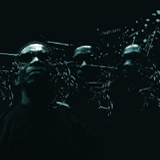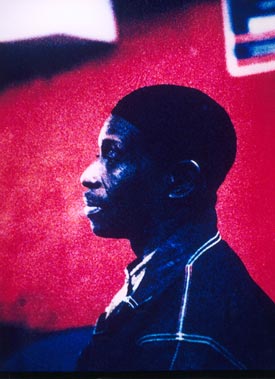
http://www.kindamuzik.net
ernaast
Onze laatste liverecensie.
Onze laatste albumrecensie.
Ons laatste interview.
Onze laatste video.
Tony Allen - As long as I'm alive I will never bore you
Tony Allen is the beat in afrobeat. Together with Fela Anikulapo Kuti he created the genre in the sixties, formed the group Africa 70 and achieved legendary status in the seventies. After leaving the band in 1979 he started his own, Egypt 80, and played with the likes of King Sunny Adé and Ray Lema. Another ten years later he started working on his own, although always with other artists collaborating, with the French Comet label signing him halfway through the nineties. He released an album, Black Voices, and started the new century with the Allenko Brotherhood project and another album, Psyco on da Bus. And now there's Homecooking, an album that could well be the new standard for afrobeat.
We decided to go to the fancy First Class restaurant at Amsterdam Central Station to hear some words of wisdom from the man who plays like four.
Tekst: Dave Roozendaal
Publicatiedatum: 04 oktober 2002
 Afro. Beat. Two words became one when one young man called Fela Kuti asked another young man, Tony Allen, to join him and his band that played a blend of American jazz and Nigerian highlife music. It was in Lagos, Nigeria, 1964, and a new chapter in musical history was about to be written.
Afro. Beat. Two words became one when one young man called Fela Kuti asked another young man, Tony Allen, to join him and his band that played a blend of American jazz and Nigerian highlife music. It was in Lagos, Nigeria, 1964, and a new chapter in musical history was about to be written.
Tony Allen developed his drum style playing in Victor Olayia's Cool Cats in the fifties. Having started playing the clavecimble, he got behind the drum kit when their drummer left.
"I was always looking for my sound," Tony says. "Listening to the great drummers of jazz, Art Blakey, Max Roach, I wanted to achieve something like they had, I wanted be unique. I thought to myself, if there was to be a competition with those guys in it, and me, I could never win playing like this. Because they were superstars. So the only way to win would be by being myself. By playing my own thing. In those days I was always reading a magazine for drummers, and Max Roach had his own section in it, giving drum lessons. So I was studying hard. He was talking about the use of the hi-hat, and none of the African drummers I knew, you know, playing in higlife groups, were using the hi-hat. I wasn't, either. So I started studying that, and it was so hard, you know? But I conquered it, and I developed my style. And all the other drummers, when they saw me they said 'How do you do that? What are you doing with the hi-hat?' I started with playing highlife, then moved on to jazz, and after that I could, and would, play any kind of music. And then Fela came and I joined his band. That's how afrobeat started."
 In the last couple of years more and more dance artists have discovered the typical afrobeat rhythm, and have started using it in their electronic music.
In the last couple of years more and more dance artists have discovered the typical afrobeat rhythm, and have started using it in their electronic music.
"That is exactly what I have always wanted. The music has to stay, it is my mission to make afrobeat stay forever. So I'm always trying to take the music in new directions. Which is why I make music with new artists. Like the Allenko Brotherhood project. I made different rhythms and gave them to DJs, producers, hiphop artists, you know? So they could build the tracks around my rhythms. I don't want to repeat what we've done with Fela Kuti & Africa 70 in the seventies, and what I've done with Egypt 80 in the eighties. When people talk about afrobeat, they want to hear the old stuff. Why? Why do more of the same stuff? If you really want the music to stick around, you have to change it. You have to move with time, because if you don't, time will pass you. The core is the rhythm, my rhythm. That will not change. The rhythm is afrobeat. But that doesn't mean you can't make it sound fresh. So no repeating. As long as I'm alive, I will never bore you. "
One of the reasons why afrobeat is so popular with DJs is that the music mixes with everything.
"There, you have said it. You got it down! Afrobeat is the only music that came directly out of Africa that works in a discotheque. Modern dance music is all 4/4 beats, be it a breakbeat, house, techno, hiphop, it's all 4/4. Afrobeat isn't. Sometimes it's 6/8, sometimes it's 3/4, but you can always fuse it with other music, you know? It's tight, it's a groove. You have to be really disciplined a drummer to be able to play it, because it's hard. It's like four drummers playing at the same time, the timing is strange at first. When I play with new people they go 'hmmm, how can we play along with this, this is weird'. But then they feel the groove, and then we can start making music."
After the beforementioned Allenko Brotherhood project and the Psyco On the Bus album (both on the French Comet label -DR), Homecooking is Tony Allen's third big project in two years. Several artists from today's pop music world play on the album, like Damon Albarn (The Gorillaz, Blur) and UK rapper Ty.
"One of the groups participating in the Allenko Brotherhood project were Unsung Heroes from London. Ty is one of their rappers. His parents are Nigerians, but he grew up in the UK. His mother used to go see me and Fela when we were playing in Lagos at a club called The Shrine, and she was always playing our music at home. So he knew me and he was really excited to work with me. We connected, and so I asked him to make the album with me. He brought the others in. It was great working together. We were all like family, good vibes all over.
It took me a long time though to finish this album, two years I have been working on it. I wasn't satisfied anymore with the things I had done so far. It was the past, and I had to do some homework to come up with something new. It was like being in the kitchen, preparing a good meal. You know, nowadays everything is fast, fast, fast. People don't take time anymore to do things properly, to eat properly. Look around you, this is a fancy restaurant, you know, you got the waiters all dressed up, the building is beautiful, very classy. And you pay good money for a meal. But do you think there is a proper cook behind those doors over there, in the kitchen? Of course not! There's a guy waiting for the waiter to come in with the note saying 'I need this, this, this and that'. And then he goes to the fridge, takes out a couple of plates and sticks them in the microwave. And then you get it. And it wil taste good, but it won't be nutricious. Because it's not made with love. It hasn't been prepared with fresh greens, fresh meat, fresh herbs. And so it is with everything in life, not just food. If you want to do a proper job, take your time for it. So that's why I called the album Homecooking, that's why I made the song Homecooking. Because obviously, I'm not only talking about food there."
 Like on Fela's albums and those of modern day bands like the Antibalas Afrobeat Orchestra, there's some pretty conscious lyrics on Homecooking. It's almost as if afrobeat were perfect for politically charged music.
Like on Fela's albums and those of modern day bands like the Antibalas Afrobeat Orchestra, there's some pretty conscious lyrics on Homecooking. It's almost as if afrobeat were perfect for politically charged music.
"In a way, but isn't all music? Of course Fela was political, up to a point where it became dangerous for us in Nigeria. But even nowadays, I can hardly go to my own country. Not because I used to be in Africa 70, but because it is just dangerous, period. The music, it has to be played live at night, you have to experience it at night. But the nightlife in Lagos, I can't do it, it's too dangerous. You know this year I played in Lagos for the first time in twenty years. Twenty years! I have been in Europe for nineteen years now, I'd love to go back to Nigeria, but I won't, because I wouldn't be able to play there. And I have to play, I can't live without playing. So here I am. I'm living in Paris now, but I would like to get out of there. Paris is boring. And now, since the elections, we are in deep shit. Before, we were in deep shit, too, but now, it has doubled. Now both the government and the president are conservatives. I like this [Amsterdam], this is a nice place. I can compare this to London. London is great, I'd like to move there. There is so much going on, the people live the music there. But my family doesn't want to leave France. So I'll have to tour a lot [laughs]. I'll be touring with a small band, Ty is coming with us too, it's going to be good, I'm really looking forward to it. What I'm hoping for now is that I will get out of the album what I put into it, know what I mean? So I can travel more, get inspiration. For new things. Always for new things."
Homecooking is released by Comet Records
Tony Allen will be playing @ the Melkweg, Amsterdam
date: November 12, 2002
more info: www.melkweg.nl
http://www.kindamuzik.net/achtergrond/tony-allen/tony-allen-as-long-as-i-m-alive-i-will-never-bore-you/1923/
Meer Tony Allen op KindaMuzik: http://www.kindamuzik.net/artiest/tony-allen








Deel dit artikel: